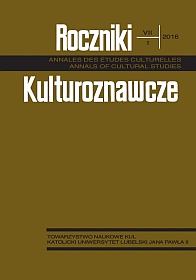Artificial Intelligence Methods in Digital Philosophy
Abstract
The paper discusses the perspectives of digital philosophy in the context of the formal tools available in Artificial Intelligence. These include, first and foremost, engineering ontologies and the methods of their application. In particular I discuss foundational ontologies, a type of engineering ontologies, which I consider as the basic form of digital philosophy.
References
Batres Rafael, West Matthew, Leal David, Price David, Naka Yuji (2007). An upper ontology based on ISO 15926. „Computers & Chemical Engineering” 31(5-6), s. 519-534.
Brachman Ronald J., Levesque Hector J. (2004). Knowledge Representation and Reasoning. Morgan Kaufmann.
Buckner Cameron, Niepert Mathias, Allen Colin (2011). From encyclopedia to ontology: toward dynamic representation of the discipline of philosophy. „Synthese” 182, 205-233. DOI: 10.1007/s11229-009-9659-9.
D’iorio Paolo (2009). Discovery. D1.8 Final Report. Pobrano z lokalizacji http://www.discovery-project.eu/reports/discovery-final-report.pdf
Doerr Martin (2003). The CIDOC CRM – An Ontological Approach to Semantic Interoperability of Metadata. „AI Magazine” 24(3), 75-92.
Douven Igor (2010). Simulating peer disagreements. „Studies in History and Philosophy of Science” 41, 148-157. DOI:10.1016/j.shpsa.2010.03.010.
Fitelson Branden, Zalta Edward N. (2007). Steps Toward a Computational Metaphysics. „Journal of Philosophical Logic” 36(2), 227-247.
Floridi Luciano (2009). Against digital ontology. „Synthese” 168, 151-178. DOI: 10.1007/ s11229 -008- 9334-6.
Floridi Luciano (2015). Semantic Conceptions of Information. Pobrano z lokalizacji Stanford Encyclopedia of Philosophy: http://plato.stanford.edu/entries/information-semantic/
Foxvog Douglas (2010). Cyc. W: Poli Roberto, Healy Michael, Kameas Achilles (red.). Theory and Applications of Ontology: Computer Applications. Springer Netherlands s. 259-278.
Garbacz Paweł (2012). Prover9's Simplification Explained Away. „Australasian Journal of Philosophy” 90(3), 585-592. DOI:10.1080/00048402.2011.636177
Garbacz Paweł, Trypuz Robert (2012). Ontologie poza ontologią. Studium metateoretyczne u podstaw filozofii. Lublin: Wydawnictwo KUL.
Goczyła Krzysztof (2011). Ontologie w systemach informatycznych. Warszawa: Akademicka Oficyna Wydawnicza EXIT.
Grenon Pierre, Smith Barry, Goldberg Louis (2004). Biodynamic Ontology: Applying BFO in the Biomedical Domain. W: Pisanelli Domenico M. (red.). Ontologies in Medicine (strony 20-38). Amsterdam: IOS Press.
Guizzardi Giancarlo, Wagner Gerd (2004). A Unified Foundational Ontology and Some Applications of It in Business Modeling. „CAiSE Workshops” (Ryga) 3, s. 129-143.
Gustafsson Johan E., Peterson Martin (2012). A computer simulation of the argument from disagreement. „Synthese” 184, s. 387-405. DOI: 10.1007/s11229-010-9822-3.
Hansson Sven Ove (2000). Formalization in Philosophy. „The Bulletin of Symbolic Logic” 6(2), s. 162-175.
Hennicke Steffen, Gradmann Stefan, Dill Kristin, Tschumpel Gerold, Thoden Klaus, Morbindoni Christian, Pichler Alois (2005). D3.4 – Research Report on DH Scholarly Primitives. Final 2.0. Pobrano z lokalizacji https://dm2e.eu/files/D3.4_2.0_Research_Report_on_DH_Scholarly_Primitives_150402.pdf
Herre Heinrich (2010). General Formal Ontology (GFO): A Foundational Ontology for Conceptual Modelling. W: Poli Roberto, Healy Michael, Kameas Achilles (red.). Theory and Applications of Ontology: Computer Applications. Springer Netherlands s. 297-345.
Horrocks Ian, Kutz Oliver, Sattler Ulrike (2005). The Irresistible SRIQ. Proceedings of the OWLED*05 Workshop on OWL: Experiences and Directions, Galway, Ireland, November 11-12, 2005.
Horsten Leon (2013). Mathematical Philosophy? W: Andersen Hanne, Dieks Dennis, González Wenceslao, Uebel Thomas, Wheeler Gregory (red.). New Challenges to Philosophy of Science. Springer Verlag s. 73-86.
IFLA. (1998). Functional Requirements for Bibliographic Records: Final Report. K. G. Saur.
International Standard Organisation. (2009). ISO 15836:2009 – Information and documentation – The Dublin Core metadata element set.
Kamiński Stanisław (1989). Aksjomatyzowalność klasycznej metafizyki ogólnej. W: Stanisław Kamiński. Jak filozofować? Studia z metodologii filozofii klasycznej. Do druku przygotował Tadeusz Szubka. Lublin: TN KUL 1989 s. 135-149.
Kroes Peter, Meijers Anthonie (2006). The dual nature of technical artefacts. „Studies in History and Philosophy of Science” Part A, 37(1), s. 1-4.
Kutz Oliver, Mossakowski Till (2011). A modular consistency proof for Dolce. Proceedings of the Twenty-Fifth AAAI Conference on Artificial Intelligence and the Twenty-Third Innovative Applications of Artificial Intelligence Conference (strony 227–234). Menlo Park, CA: AAAI.
Landesman Betty (2011). Seeing Standards: A Visualization of the Metadata Universe http://www.dlib.indiana.edu/~jenlrile/metadatamap/. „Technical Services Quarterly” 28(4), 459-460. DOI: 10.1080/07317131.2011.598072.
Mácha Jakub, Falch Rune J., Pichler Alois (2013). Overlapping and competing ontologies. W: Proceedings of the 1st International Workshop on Collaborative Annotations in Shared Environment. ACM s. 5:1-5:4.
Masolo Claudio, Borgo Stefano, Gangemi Aldo, Guarino Nicola, Oltramari Alessandro (2003). Ontology Library. WonderWeb Deliverable D18. Laboratory For Applied Ontology, ISTC, CNR.
Mizoguchi Riichiro (2010). YAMATO: Yet another more advanced top-level ontology. Advances in Ontologies. W: Proceedings of the Sixth Australasian Ontology Workshop. Adelaide s. 1-16.
Motta Enrico (1998). An Overview of the OCML Modelling Language. W: Proceedings of the 8th Workshop on Knowledge Engineering: Methods & Languages (KEML’98). Karlsruhe.
Murawski Roman (2006). The Present State of Mechanized Deduction, and the Present Knowledge of Its Limitations. „Studies in Logic, Grammar, and Rhetoric” 22(9) s. 31-60.
Nieznański Edward (1980). W kierunki formalizacji tomistycznej teodycei. Warszawa: ATK.
Nieznański Edward (1987). Formalizacja filozofii – metoda czy maniera? „Roczniki Filozoficzne” 35(1), 59-69.
Niles Ian, Pease Adam (2001). Towards a standard upper ontology. W: Proceedings of the International Conference on Formal Ontology in Information Systems (strony 2-9). ACM s. 2-9. DOI: 10.1145/505168.505170.
Oppenheimer Paul E., Zalta Edward N. (2011). A Computationally-Discovered Simplification of the Ontological Argument. „Australasian Journal of Philosophy” 89(2) s. 333-349.
Oppenheimer Paul E., Zalta Edward N. (1991). On the Logic of the Ontological Argument. „Philosophical Perspectives” 5 s. 509-529.
Paradowski Dariusz (red.) (2010). Digitalizacja piśmiennictwa. Warszawa: Biblioteka Narodowa.
Pasin Michele, Motta Enrico (2011). Ontological requirements for annotation and navigation of philosophical resources. „Synthese” 182 s. 235-267. DOI: 10.1007/s11229-009-9660-3.
Pichler Alois, Zöllner-Webe Amélie (2013). Sharing and debating Wittgenstein by using an ontology. „Literary and Linguistic Computing” 28(4) s. 700-707. DOI: 10.1093/llc/fqt049.
Schreibman Susan, Siemens Ray, Unsworth John. (2004). A Companion to Digital Humanities. Oxford: Blackwell.
Soldatova Larisa N., Clare Amanda, Sparkes Andrew, King Ross D. (2011). An ontology for a Robot Scientist. „Bioinformatics” 22(14), e464-e471. DOI: 10.1093/bioinformatics/btl207.
Twardowski Kazimierz (1927/1965). O czynnościach i wytworach. W: Kazimierz Twardowski. Wybrane pisma filozoficzne. Warszawa: PWN s. 217-240.
Unsworth John (2000). Scholarly Primitives: what methods do humanities researchers have in common, and how might our tools reflect this? Symposium on “Humanities Computing: Formal Methods, Experimental Practice” at King’s College London. Pobrano z lokalizacji http://www3.isrl.illinois.edu/unsworth/Kings.5-00/primitives.html
Wand Yair, Weber Ron (1995). On the deep structure of information systems. „Information Systems Journal” 5(3), s. 203-223. DOI: 10.1111/j.1365-2575.1995.tb00108.x.





